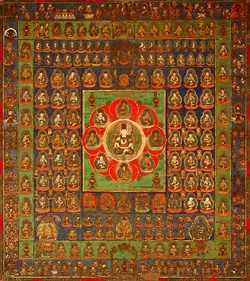Difference between revisions of "Determinate groups"
m (Text replacement - "the Dharma" to "the Dharma") |
|||
| Line 1: | Line 1: | ||
[[File:Mandal Japanese.jpg|thumb|250px|]] | [[File:Mandal Japanese.jpg|thumb|250px|]] | ||
<poem> | <poem> | ||
| − | + | [[determinate groups]] | |
| − | [決定性] ( Jpn ketsujo-sho ) | + | [[決定性]] ( Jpn [[ketsujo-sho]] ) |
| − | Those predestined by nature to be [[voice-hearers]], [[cause | + | Those predestined by [[nature]] to be [[voice-hearers]], [[cause-Awakened]] ones, or [[Bodhisattvas]]. The {{Wiki|determinate}} groups correspond to three of the five natures, a [[Doctrine]] set forth by the [[Dharma Characteristics]] (Chin [[Fa-hsiang]]; Jpn [[Hosso]]) school dividing [[human beings]] into five groups according to their inborn [[religious]] capacity. The other two are |
| − | (1) an | + | (1) [[an indeterminate group]], which has two or all of the natures of the [[determinate group]], and |
| − | (2) those without the nature of [[Buddhahood]] or the [[enlightenment]] of [[voice-hearers]] or [[cause | + | (2) those without the [[nature]] of [[Buddhahood]] or the [[enlightenment]] of [[voice-hearers]] or [[cause-Awakened]] ones. Those predestined to be [[voice-hearers]], those predestined to be [[cause-Awakened]] ones, and those predestined to be [[Bodhisattvas]] are called the [[determinate}} groups]] because the state of [[Awakening]] they will achieve is predetermined. The term most often applies to those predestined to become persons of the [[two vehicles]], i.e., [[voice-hearers]] and [[cause-Awakened]] ones, and who therefore cannot attain [[Buddhahood]]. |
| − | See also five natures. | + | See also [[five natures]]. |
</poem> | </poem> | ||
{{R}} | {{R}} | ||
Latest revision as of 05:45, 5 February 2014
determinate groups
決定性 ( Jpn ketsujo-sho )
Those predestined by nature to be voice-hearers, cause-Awakened ones, or Bodhisattvas. The determinate groups correspond to three of the five natures, a Doctrine set forth by the Dharma Characteristics (Chin Fa-hsiang; Jpn Hosso) school dividing human beings into five groups according to their inborn religious capacity. The other two are
(1) an indeterminate group, which has two or all of the natures of the determinate group, and
(2) those without the nature of Buddhahood or the enlightenment of voice-hearers or cause-Awakened ones. Those predestined to be voice-hearers, those predestined to be cause-Awakened ones, and those predestined to be Bodhisattvas are called the [[determinate}} groups]] because the state of Awakening they will achieve is predetermined. The term most often applies to those predestined to become persons of the two vehicles, i.e., voice-hearers and cause-Awakened ones, and who therefore cannot attain Buddhahood.
See also five natures.
